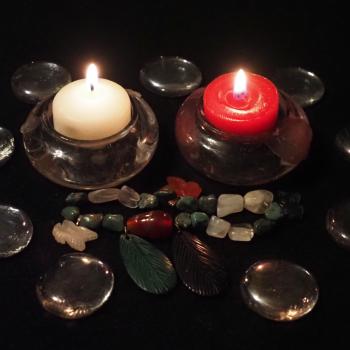Hold Your Fire (Mindful Observation)
Mindful awareness is one of the key yogic practices for transformation.
As painful as it can be, taking an honest look at what sets you off is one step to freedom. As with so much else in life, mindfulness is the key. Be aware of your reactions as you step into the family circle. What happens to your body? What emotions come up? Notice the thoughts that cycle through your mind. Notice what you say and do—is it reactive? Are you withdrawn? Friendly? Do your words feel authentic? Be aware of the thoughts that grab you. Then refocus. Become the knower of these thoughts and feelings. If need be, go into the bathroom, take some deep belly breaths, and tune into the awareness that holds all this.
Thought-Tranformation (Practicing the Opposite)
This famous practice from the yogasutra is the core tactic for changing your mind by changing your thoughts. Once you've noticed your reactive thoughts, you can remember to turn them around. When you catch yourself thinking, "I can't stand the way Freddy chews" quickly find an opposite, positive thought like "I love Freddy's sense of humor." "These kids are driving me nuts" can become "Isn't their energy wonderful." And so on. Even if you don't fully believe it, your effort to change your thinking will calm your stress hormones and might even inspire a feeling of love or compassion.
Give Your Blessing (Positive Intention)
One of the great practices of the devotional yogic tradition is the practice of offering blessing. So, whether you feel loving toward your family members or not, start with the intention that your presence in the gathering will be a blessing. Then, whenever your glance falls on someone, send them a silent blessing. A friend of mine tried this during a particularly gnarly weekend with her siblings and their spouses. At one point, a fierce argument broke out between her brother and sister. My friend, who was sitting near them, kept repeating silently, "Blessings to Sara. Blessings to Rick." A few minutes later, the two squabbling siblings looked at each other and started to laugh. "We've been doing this since we were 6," said her sister. "Truce?" My friend swears that it was the power of her blessing. We'll never know. But one thing we do know: it didn't hurt.
Lessons Learned
Human beings need to make meaning; it's simply how we are. When we have trouble with family members it's often because we've assigned painful meanings to our past or present encounters. If your father's gruffness translated for you into the feeling of not being loved, or your mother's anxiety created tremors of fear in your stomach, consider what these folks are teaching each other—and you. Is it about letting go of anger? Recognizing that we are responsible for our own feelings? Loving no matter what? Notice how your attitude shifts toward these people when you see them as a teaching pod rather than as the people who should have loved you better or done better with their lives, or as the one group of people in whose presence you feel most self-critical or lacking. Seeing your family as your teachers will immediately loosen your feelings of negativity. If the meaning of your relationships with family members is to learn, then no encounter is ever negative, because every one of them has something to show you.
Drawing Boundaries
Sometimes, with some family members, it's important to keep your distance. There may be people in your family whose behavior is abusive or seriously hostile, whose presence causes you so much pain that strong boundaries become imperative. When a family situation is truly toxic for you, staying away from family gatherings may be your best option. And even with less toxic situations, there are times when it may be important to keep some distance.
Ultimately, it's our relationships that test our attainment, our maturity, our capacity for growth. More than that, they are our opportunity for healing. In the Jewish tradition, there's a teaching that human beings come together for the purpose of tikkun, a Hebrew word that means "fixing." In other words, our relationships are the arena through which we fix what has been broken, not only between the two of us, but between human beings in general. Fixing doesn't necessarily mean becoming best friends with every one of your family members. But in every family, there are streams of brokenness, unconsciousness, and grief that are passed on, along with family gifts and wisdom. Each generation has the power to shift something in the family heritage. Sitting across the table at Thanksgiving, toasting the bride at a family wedding, it's sometimes possible to recognize what needs healing in the family line. And with every conscious recognition of the beauty and pain that each of your family members carry, with every opening into compassion, you heal a piece of that brokenness. Sometimes, one family member's loving intention is just what is needed to make the crucial difference.





